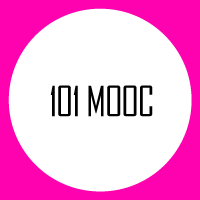http://www.scribd.com/doc/5888861/HIM101-Syllabus
Geoff Cain, Humboldt State University
Kim Vincent-Layton, Humboldt State University
MOOCs, Student Success, and Instructional Design
One of the common problems in online learning and MOOCs is student success and retention. There traditionally is a large gap between the success and retention rates of face-to-face and online courses. Just as some students need help in understanding how online education works (motivation, time management, study skills, etc.), students will also need help in understanding how to successfully take a MOOC. According to my research, the most common cause of this gap is lack of student preparation: students have spent 12 years learning to be face-to-face students and very little time learning how to be effective online learners. To address this in our online courses, I created a free, fully online, two-week course called “DE 101†(Distance Education 101). This course addressed the technical and learning skills needed to be effective online learners. All of the technical and metacognitive skills were built into the assignments. The design for this course was based on a Health Information Management course that I designed and co-taught. That course was designed to introduce students to new technology, learn how to leverage online technology for their education and professional development, create of intelligent networks, and, even more significantly, how to manage technological change. My experiences with MOOCs has reinforced my conclusions:
Students need help in learning how to be independent, self-motivated learners.
The skills of successfully taking online courses can be taught.
Online courses can facilitate peer networks that not only help the students through a course but help them learn long after the course is over.
I would like to further develop these course materials into a MOOC for students (open to any college student), a handbook on peer learning and networks for students, and an instructional design guide and rubric for teachers interested in MOOCs.
The MOOC will be facilitated and curated by instructors but the students will be guided towards taking a lead in research and discussions. The handbook on peer learning will be an on-going project in the MOOC and will be licensed with an open Creative Commons license, as will the instructional design guide and rubric. It has been my experience with the “traditional” online versions of these courses that even other instructors often wish to participate to help them learn more about how students learn online. This project will not only help students learn to navigate the new world of online learning and MOOCs, but help instructors understand new roles for teachers as facilitators, curators, and guides to online learning. The links below map the growth of these ideas from the HIM course to DE 101 to what will become the eLearning 101 MOOC.
http://cain.blogspot.com/2011/06/de-101-preparing-students-for-online.html
http://www.scribd.com/doc/148378333/DE-101-Syllabus-2010
http://cain.blogspot.com/2012/07/why-moocs-work.html
Tags: MOOC, Open Education Resource, Self-Directed Learning
Posted in Gallery |
